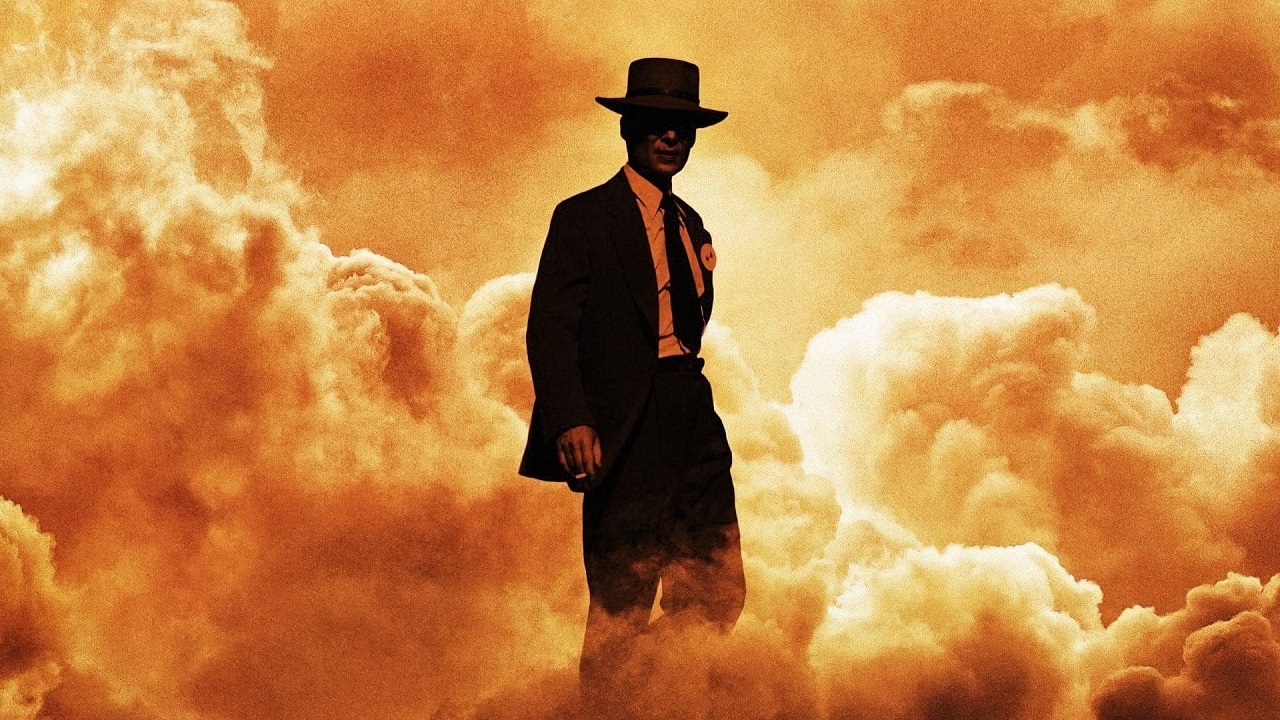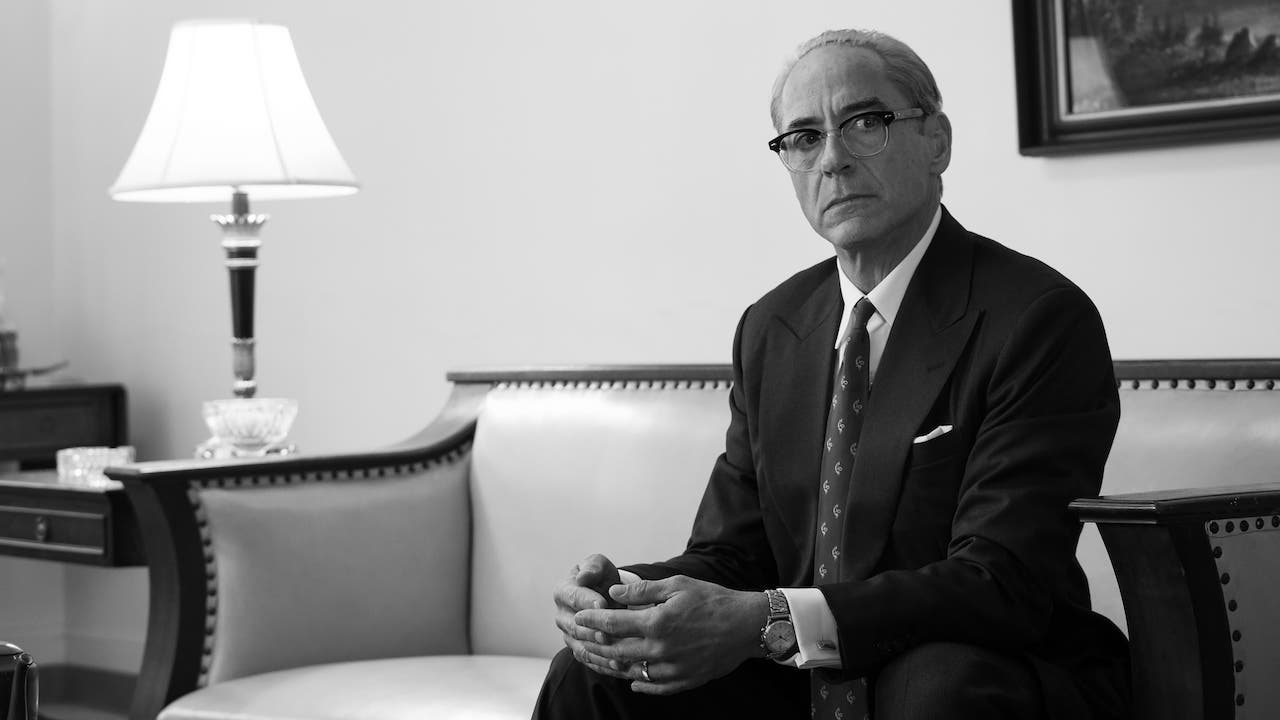Oppenheimer isn’t as morally complex as it thinks it is, or needs to be
Rhythmically the atomic biopic means business; its political morals and intellect are separate matters.

Blockbuster director Christopher Nolan goes bigger in style and spectacle than ever before with Oppenheimer—and what’s bigger than the A-Bomb? Luke Buckmaster feels there’s something missing in the biopic’s fragmented moral message.
Christopher Nolan’s film about the “father of the atomic bomb,” J. Robert Oppenheimer, is intensely scattered and intentionally disorderly, bending over backwards to create a feeling of uncontrollable escalation. The thrust of the drama heads in one direction—to the invention and deployment of the first nuclear weapons—but its various bits and pieces fly about like stirred up chemical compounds, jumping timelines and even colour schemes, with the nervy chutzpah of an Oliver Stone movie. There isn’t much to hold onto in the whirlwind of the first act, other than Cillian Murphy’s leading performance: a projection of disquieting intelligence that coyly allows for inferences of humanity, should you wish to observe them.
The excitement Nolan builds is palpable, but the exhiliration is stomach-sinking. We can’t help but react to the swelling score, the claps of thunder, the jagged cuts, the crescendoing energy. We’re swept along by the currents of a story that resulted in almost unthinkable (except we know it happened) and near unimaginable (ditto) devastation. The great François Truffaut famously said “there’s no such thing as an anti-war film,” arguing you can’t recreate war on screen without in some way celebrating it. Even—perhaps especially—as spectacle. I wonder if some of the same logic applies here.
It’d be preposterous to say Nolan has made a pro-bomb movie, but there were lots of ways to contextualise this story, lots of ways to tell it. It didn’t need to be so juiced up. All the sound and fury means there’s no cool hand guiding the messaging. Lust for big visions and stylistic verve helps explain Nolan’s biggest mistake: not getting his moral framing right.
I expected the film to make a point that everybody’s actions were sickening—including of course Oppenheimer’s. It kind of gets there, but the presence of a more traditional villain, carved from the machinations of American politics—Robert Downey Jr.’s Lewis Strauss, a bureaucrat serving in the U.S. Atomic Energy Commission—wildly changes its emphasis. It’s laughable to suggest Oppenheimer and Strauss’ moral crimes are comparable, but Nolan goes further than that: emphasising the latter’s chicanery in highlighter pen while the protagonist receives the soft glows of nuance.

The opening scenes are fragmentary, the cuts sharp. Nolan—who is always interesting visually—is pulled as if by magnet to images illustrating energy: water, fire, compounds. You know the film can’t stay scattered like this. If there’s a centre of gravity, it’s Murphy, with his sunken cheeks and malnourished face. I can’t decide if he looks more like a genius scientist or a sad clown. First act pivots include Oppenheimer beginning to teach American university students, meeting contemporaries such as Albert Einstein (Tom Conti) and having a romantic relationship with the highly intelligent but troubled communist Jean Tatlock (an impressively sad-eyed Florence Pugh).
This aspect of the film works very well: it’s a dramatically fraught and interesting relationship, casting a shadow over their lives. They have a prickly kind of passion: you feel both closeness and distance between them, the gaps they’ll never close. And you believe every second of it. Even later scenes that are tinted with surreal imagery, illustrating how old lovers haunt each other: the passion never ending, the flame always flickering.
From the start Nolan jumps around in time, often leaping forwards to characters looking back (via dialogue), including Oppenheimer being grilled at a kangaroo court hearing. The film clicks into higher gear upon the arrival of Matt Damon’s Lieutenant General Leslie Richard Groves, the director of the Manhattan Project, who approaches Oppenheimer and recruits him as the leader of its secret weapons laboratory. Many scenes are built around conversations reiterating Oppenheimer’s intelligence; we get it, we get it. Much is also made of his interest in left-leaning politics, but surprisingly little is said about this—we don’t come away with a clear impression of where he sits ideologically. Maybe he didn’t know himself. But it seems certain he was a person who searched for moral and spiritual purpose.
The film could’ve been richer if the director stopped slicing up his drama and configured well-developed moral and intellectual positions. What’s he really saying about nuclear weapons and catastrophic arms races, beyond an inevitably cautionary message—that old one about the genie and the bottle? Was proliferation a historical inevitability? What does Nolan think about the concept of mutually assured destruction (one of the subjects satirised in Kubrick’s great, and still relevant, Dr Strangelove)?

This film can’t and doesn’t have to answer every question you throw at it. But if any film should have carefully defined messaging, it’s this one. The aforementioned topics are touched on but you can tell Nolan is mostly interested is spectacle and narrative arrangement. Blockbuster directors get consumed by the spirit of one-upmanship…and what’s bigger than the A-bomb? Nolan does stage scenes showing Oppenheimer dabbling in leftist circles, fraternising with communists, turning his classrooms into progressive hothouses. But these scenes are clipped and the director keeps whooshing away, scattering the pieces, zhuzhing up the structure. He’s like a magician whose brilliance at sleight of hand has made him forgot the simple pleasures of patter, stretching things out, letting moments breathe.
When I think about Inception, Nolan’s magnum opus, I think about sets, I think about staging, I think about individual scenes, I think about clever interplay between digital and physical assets. When I think about Oppenheimer, I think in fragments. I think about a film made in the edit. Rhythmically it means business; its morals and intellect are separate matters.

























